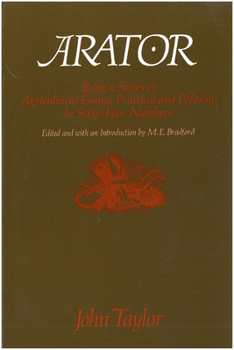Arator: Being a Series of Agricultural Essays, Practical and Political: In Sixty-One Numbers
Select Format
Select Condition 
Book Overview
This discussion of the social order of an agricultural republic is Taylor's most popular and influential work. It includes materials on the relation of agriculture to the American economy, on agriculture and politics, and on the enemies of the agrarian republic. Both statesman and farmer, Taylor is often considered the deepest thinker of all the early Virginians. M. E. Bradford was Professor of English at the University...
Format:Paperback
Language:English
ISBN:0913966266
ISBN13:9780913966266
Release Date:November 1977
Publisher:Liberty Fund
Length:426 Pages
Weight:1.27 lbs.
Dimensions:1.1" x 6.0" x 9.0"
Age Range:18 to 10 years
Grade Range:Postsecondary to Grade 5
Customer Reviews
2 ratings
The republican and agrarian thought of Virginia's Cato
Published by Thriftbooks.com User , 19 years ago
~Arator~ is very much a distinctive "series of agricultural essays-political and practical" written by Virginia statesman and planter of the Old Republic which was first published in 1813. John Taylor, also deemed the Sage of Hazelwood, dedicates a considerable portion of this book reflecting upon the socio-economic and political order of an agrarian republic which he sought to defend. In his book Arator, John Taylor speaks to a multitude of subjects and issues. He also offers practical and perhaps dated advice on farming (i.e. manuring, livestock, draining, etc.) as well which though extraneous may be a historical curiosity to some modern readers. To sketch a brief biography of the man, John Taylor of Caroline, in the words of M.E. Bradford, "became the classic figure of `old republican' theory: the exemplar of an almost Roman virtus, the Virginia Cato, who soldiers, enforces the law, writes in its defense and of the life it secures, and serves the state well when called to office because he has something better to do-because there are lands and people of whose good is a faithful steward." He rose to the rank of lieutenant-colonel serving in both the Continental Army and Virginia militia. He adopted the profession of his stepfather, and became an accomplished attorney. He turned his oratory abilities to the task of statesmanship and became a legislator in the Virginia House of Delegates and the United States Senate. He grew restless in the practice of law and politics and eventually retired to his plantation where he farmed. Though, he was not aloof from political concerns and discourse, as he wrote a number of books and political tracts. John Taylor of Caroline dedicated much of his political life in defense of the Constitution as a strict constructionist and a principled republican. Likewise, he fought against the perceived depredations of the artificial aristocracy of "paper and patronage" that was wrapping itself around the edifice of the federal government like some sly serpent. He assailed the corrupting mercantilist system of patronage and privilege that the centralising nationalists sought to import from England. According to Taylor, if this moneyed oligarchy thoroughly entrenched itself than the inevitable dire results would be consolidation, empire, monopoly, special privilege, jobbery, patronage, legal plunder and theft by taxation. Taylor no doubt had nothing but disdain for Hamilton's scheming to conscript legions of children and women to work factories. He felt strongly that either imperial consolidation or disunion would be the end result, and in any case, it entailed the ruin of the republic. Taylor minced no words in his vehement denunciations of the "paper aristocracy." Taylor saw this mercantilist class committed to plundering the productive agricultural, mechanical and labour interests so as to endow opulence upon the manufacturers, financiers, speculators and stock-jobbers. This scheming oligarchy driven by material avari
Politics and farming: Old South Style
Published by Thriftbooks.com User , 21 years ago
Arator is a series of essays that link farming and American politcs. Taylor's use of farming as a vehicle to discuss politics predates a similar move made 100 years later by the Nashville Agrarians (see I'll Take My Stand). I agree with other reviewers who state that Arator no longer gives practical advice on farming. But the sections on *why* farming is important should still be read. Students of Haiti/Haitian history should also read Arator. Taylor's discussion of slavery hinges on his perceptions about the Haitian revolution. It should be noted that the essays in Arator were serially published the same year Haitians defeated the French. And Arator was first collected into book form (widely read and went through many printing runs) at approximately the same time Haiti was becoming a united nation. So students of politics, of history, of the South, and of Haiti will find something valuable between the covers.






